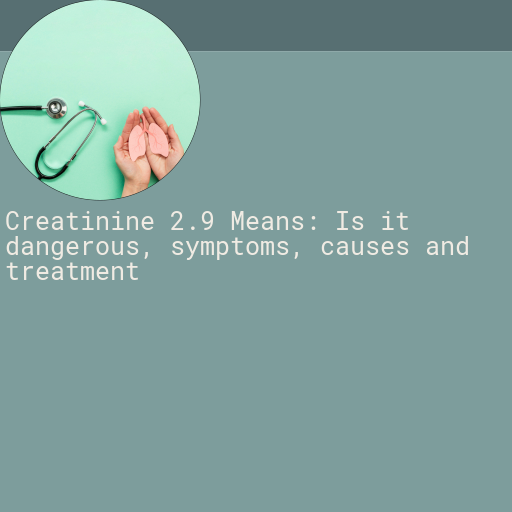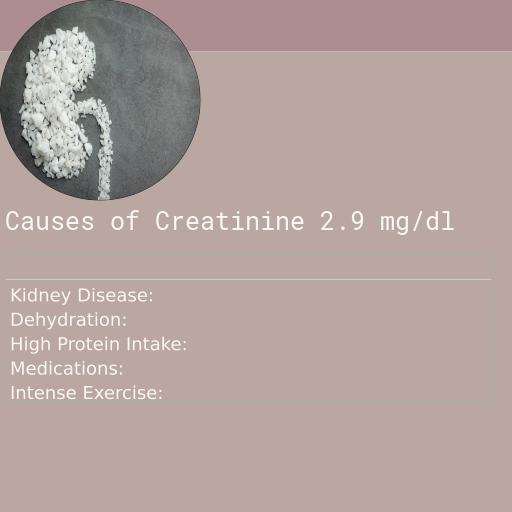Creatinine 2.9 : Is it Dangerous, Causes, Symptoms and More
When it comes to understanding our health, blood tests play a crucial role in revealing vital information about our body's functioning. One such key indicator is creatinine, a waste product produced by muscles and filtered out by the kidneys. Elevated levels of creatinine, such as a reading of 2.9, can be alarming and may signal underlying health issues. In this blog, we will delve into the potential dangers associated with high creatinine levels, explore the causes behind such an increase, and discuss the symptoms you should be aware of. Understanding these aspects can help you take proactive steps towards better kidney health and overall well-being.

What is Creatinine
Creatinine is a byproduct of protein breakdown and is considered a waste product that has no use in the body. It is primarily removed from the bloodstream by the kidneys and excreted in urine. Elevated levels of creatinine can be an indicator that the kidneys are not functioning efficiently, as they are unable to filter out this waste properly. Understanding the implications of high creatinine levels is crucial for maintaining kidney health and overall well-being.
- Muscle Metabolism: Creatinine is a byproduct of the normal wear and tear on muscles of the body. The more muscle mass you have, the higher your creatinine levels can be.
- Dietary Intake: Consuming large amounts of red meat or other protein sources can temporarily elevate creatinine levels, as creatinine is derived from creatine, which is found in meat.
- Kidney Function: The kidneys filter out creatinine. Impaired kidney function can lead to an accumulation of creatinine in the blood.
- Medications: Certain drugs, such as some antibiotics and nonsteroidal anti-inflammatory drugs (NSAIDs), can affect kidney function and alter creatinine levels.
- Exercise: Intense physical activity can cause a temporary increase in creatinine levels due to muscle breakdown.
- Dehydration: Lack of adequate fluids can lead to higher concentrations of creatinine in the blood.
Normal Range of Creatinine in Adults
The normal range of creatinine in adults can vary slightly depending on the lab and the individual's muscle mass, age, and sex. Typically, for men, the normal range is approximately 0.6 to 1.2 milligrams per deciliter (mg/dL), while for women, it is slightly lower, approximately 0.5 to 1.1 mg/dL. Higher levels of creatinine can indicate potential issues with kidney function, making it crucial to understand what these numbers signify and when they might be a cause for concern.
| Age Group | Normal Creatinine Range (mg/dL) |
|---|---|
| Infants (0-1 year) | 0.2 - 0.4 |
| Children (1-12 years) | 0.3 - 0.7 |
| Adolescents (13-17 years) | 0.5 - 1.0 |
| Adult Males | 0.6 - 1.2 |
| Adult Females | 0.5 - 1.1 |
| Older Adults (60+ years) | 0.6 - 1.3 |
Causes of Creatinine 2.9
Elevated creatinine levels can be a significant health concern, often indicating potential issues with kidney function. The kidneys play a crucial role in filtering waste products from the blood, and creatinine is one of these waste products. When the kidneys are not functioning properly, creatinine can accumulate in the bloodstream. There are several causes for elevated creatinine levels, including chronic kidney disease, dehydration, and certain medications. Understanding the root causes is essential for effective treatment and management of this condition.
- Kidney Disease: Chronic kidney disease or acute kidney injury can significantly raise creatinine levels.
- Dehydration: Insufficient fluid intake can lead to elevated creatinine as the kidneys struggle to filter waste.
- High Protein Intake: Consuming a diet high in protein can temporarily increase creatinine levels.
- Medications: Certain drugs, such as ACE inhibitors and NSAIDs, can impair kidney function and elevate creatinine.
- Intense Exercise: Strenuous physical activity can cause a temporary spike in creatinine due to muscle breakdown.
- Diabetes: Poorly managed diabetes can damage the kidneys over time, leading to increased creatinine.
- High Blood Pressure: Hypertension can harm the kidneys, resulting in elevated creatinine levels.
- Urinary Tract Obstructions: Conditions like kidney stones or an enlarged prostate can block urine flow and increase creatinine.

Symptoms of Creatinine 2.9
When creatinine levels rise, the body often sends out warning signals that shouldn’t be ignored. Common symptoms of elevated creatinine can include fatigue, swelling (particularly in the face, wrists, ankles, or abdomen), and shortness of breath. Additionally, individuals might experience nausea, vomiting, and a noticeable decrease in urine output. Recognizing these symptoms early can be crucial for timely diagnosis and effective treatment.
- Fatigue: Elevated creatinine levels can cause a significant reduction in energy levels, leading to persistent tiredness.
- Swelling: Noticeable swelling, particularly in the face, hands, and feet, can be a sign of high creatinine.
- Shortness of Breath: Difficulty breathing or feeling breathless may occur as kidney function declines.
- Confusion: Increased creatinine levels can affect cognitive function, leading to confusion or difficulty concentrating.
- Nausea and Vomiting: Digestive issues such as nausea and vomiting are common symptoms of elevated creatinine.
- Muscle Cramps: High creatinine can lead to muscle cramps and discomfort, particularly in the legs.
- Changes in Urine Output: A decrease or change in urine output can be a significant indicator of elevated creatinine.
- High Blood Pressure: Elevated creatinine levels can contribute to higher blood pressure, which can exacerbate kidney issues.

Dangers of Creatinine 2.9
When discussing creatinine, it's crucial to understand that creatinine itself does not directly affect the body. However, elevated levels of creatinine are a significant red flag indicating potential kidney failure or other serious health issues. While creatinine is a waste product filtered out by the kidneys, its heightened presence in the blood suggests that the kidneys are not functioning properly. This malfunction can lead to the accumulation of other harmful waste products like urea, which can cause severe health complications. Understanding the implications of elevated creatinine levels is essential in addressing the underlying causes and preventing further damage to the body.
- Kidneys: Elevated creatinine levels often indicate impaired kidney function, which can lead to chronic kidney disease or kidney failure.
- Heart: High creatinine levels are associated with an increased risk of cardiovascular diseases, such as hypertension and heart failure.
- Liver: Impaired kidney function can cause the liver to work harder, potentially leading to liver damage or fatty liver disease.
- Lungs: Elevated creatinine can result in fluid retention, causing pulmonary edema and respiratory distress.
- Muscles: High creatinine levels can be indicative of muscle breakdown, leading to muscle weakness and atrophy.
- Gastrointestinal Tract: Kidney dysfunction can cause nausea, vomiting, and loss of appetite, affecting overall nutrition.
- Brain: Elevated creatinine can lead to neurological issues such as confusion, seizures, and even coma in severe cases.
- Skin: Impaired kidney function can cause dry, itchy skin and discoloration due to the buildup of toxins.
Home remedies for Creatinine 2.9
Disclaimer: Elevated creatinine levels, such as a reading of 2.9, indicate a potential kidney issue and cannot be effectively treated at home. It is crucial to seek medical advice from a healthcare professional for appropriate diagnosis and treatment. While at home, basic supportive care can include staying hydrated, maintaining a balanced diet low in salt and protein, and avoiding over-the-counter medications that can further strain the kidneys. Always consult with a healthcare provider before making any changes to your health regimen.
- Stay Hydrated: Drinking plenty of water can help support kidney function and reduce creatinine levels.
- Adopt a Kidney-Friendly Diet: Focus on consuming low-sodium, low-protein, and low-potassium foods to ease the burden on your kidneys.
- Avoid Over-the-Counter Painkillers: Pain relievers like ibuprofen and aspirin can harm your kidneys. Opt for alternatives after consulting with your healthcare provider.
- Monitor Blood Pressure: Keeping your blood pressure within a healthy range can help protect your kidney function. Regular monitoring and adhering to prescribed medications are crucial.
- Engage in Regular Physical Activity: Moderate exercise can improve overall health and support kidney function. Aim for activities like walking, swimming, or yoga.
Treatment for Creatinine 2.9
When a patient's creatinine level reaches 2.9, immediate medical treatment by a doctor is essential. The primary treatment goals include stabilizing kidney function, discontinuing any harmful drugs that may be contributing to the elevated creatinine, and treating any underlying infections that could be exacerbating the condition. These steps are crucial to prevent further kidney damage and to manage the condition effectively.
- Fluid Intake Management: Increasing fluid intake can help to flush out creatinine through the kidneys, but this should be done under medical supervision to avoid overloading the kidneys.
- Dietary Changes: Reducing protein intake can decrease the production of creatinine. A diet rich in fruits, vegetables, and grains can support kidney health.
- Medications: Doctors may prescribe medications to help manage underlying conditions such as hypertension or diabetes that can contribute to elevated creatinine levels.
- Dialysis: In severe cases, dialysis may be necessary to remove waste products and excess fluids from the blood when the kidneys are not functioning properly.
- Regular Monitoring: Frequent check-ups and blood tests can help to monitor creatinine levels and kidney function, allowing for timely adjustments to treatment plans.
GFR with Creatinine of 2.9
The Glomerular Filtration Rate (GFR) is a crucial measurement that provides an estimate of how well your kidneys are filtering waste from your blood. Unlike the absolute value of creatinine, which can be influenced by factors like age, muscle mass, and hydration levels, the GFR offers a more comprehensive view of kidney function. This is because the GFR calculation takes into account these variables, providing a more accurate reflection of your kidney health. Therefore, while a creatinine level of 2.9 might raise concerns, understanding your GFR is essential for a precise assessment of how well your kidneys are functioning and to determine the most appropriate course of action.
| Grade | GFR (mL/min/1.73 m²) | Description |
|---|---|---|
| G1 | > 90 | Normal or high |
| G2 | 60-89 | Mildly decreased |
| G3a | 45-59 | Mild to moderately decreased |
| G3b | 30-44 | Moderately to severely decreased |
| G4 | 15-29 | Severely decreased |
| G5 | <15 | Kidney failure |
What is my GFR for a creatinine of 2.9
| Age | Gender | GFR |
|---|---|---|
| 18 | male | 28.48 ml/m2 |
| 45 | male | 23.65 ml/m2 |
| 60 | male | 22.31 ml/m2 |
| 80 | male | 21.04 ml/m2 |
| 18 | female | 21.14 ml/m2 |
| 45 | female | 17.55 ml/m2 |
| 60 | female | 16.55 ml/m2 |
| 80 | female | 15.61 ml/m2 |
Table of danger posed by Creatinine 2.9 in male across different ages
| Age Group | Is Creatinne of 2.9 dangerous? |
|---|---|
| 25yrs - 95 yrs | very high, Consult a doctor immediately |
Table of danger posed by Creatinine 2.9 in female across different ages
| Age Group | Is Creatinne of 2.9 dangerous? |
|---|---|
| 25yrs - 95 yrs | very high, Consult a doctor immediately |

Which other tests should be done for a creatinine value of 2.9?
In addition to measuring creatinine levels, doctors often recommend other tests to get a comprehensive understanding of kidney function and overall health. These tests may include assessing electrolytes such as sodium, potassium, and calcium, which are crucial for maintaining fluid balance and nerve function. A renal profile can provide detailed insights into various aspects of kidney health, including blood urea nitrogen (BUN) levels and glomerular filtration rate (GFR). Blood gas levels are also important, as they help evaluate the body's acid-base balance and oxygenation status. Together, these tests offer a holistic view of a patient's condition, aiding in accurate diagnosis and effective treatment planning.
- Electrolytes: Testing for electrolytes such as sodium, potassium, chloride, and bicarbonate is crucial. These levels can indicate how well your kidneys are balancing the body's chemical environment.
- Renal Profile: A comprehensive renal profile includes tests like serum creatinine, blood urea nitrogen (BUN), and glomerular filtration rate (GFR). These metrics provide a detailed picture of kidney function.
- Blood Gas Levels: Arterial blood gas (ABG) analysis can measure oxygen and carbon dioxide levels in the blood, along with the pH. This helps in assessing the acid-base balance, which can be disrupted in kidney dysfunction.
- HbA1c: Hemoglobin A1c (HbA1c) measures average blood sugar levels over the past 2-3 months. High levels can indicate diabetes, which is a leading cause of kidney disease.
- LDH: Lactate dehydrogenase (LDH) is an enzyme found in almost every cell of the body. Elevated levels can indicate tissue damage, including to the kidneys.
- Blood Urea Nitrogen (BUN): This test measures the amount of nitrogen in your blood that comes from the waste product urea. Elevated BUN levels can be a sign of kidney dysfunction.
- Liver Enzymes: Tests for liver enzymes such as ALT, AST, and ALP can help determine if liver issues are contributing to the elevated creatinine levels, as the liver and kidneys work closely to filter and detoxify the blood.

 By: Dr.Bhargav Raut
By: Dr.Bhargav Raut